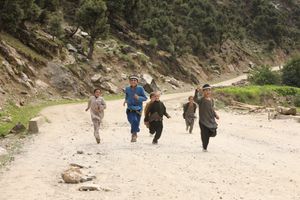By Qasim Swati (United Kingdom)
“Children are the world’s most valuable resource and its best hope for the future”, according to John F. Kennedy (1917–1963), an American politician and the 35th president of the United States. Similarly, a renowned British businesswoman, singer, actress and model (Naomi Elaine Campbell) expresses her views about children, as “Children are our future, we must take care of them with maximum effort.”
Children are the future builders of the nation. They have more potential and stamina for growth, development, progress, creativity and innovation than adults. That is why Giacomo Leopardi (1798–1837), an Italian philologist, essayist, poet and philosopher, believes that children find everything in nothing; men find nothing in everything.
Anyone under the age of 18 can be defined as a child who can have many rights, under the United Nations Convention on the Rights of the Child (UNCRC). Unfortunately, most of the Afghan children cannot enjoy these rights, due to the conflict, political and economic instability and other factors, faced by the Afghan people in the country. For instance, under Article 6 of the UNCRC, a child has the right to life, survival and development, but so many children have been injured, displaced and killed during the war in Afghanistan so far.
It is estimated that, at least, 32,945 children have been killed or maimed between 2005 and mid-2021, excluding those who have died, as a result of diseases, poverty and hunger, as claimed by Save the Children (an International Children’s Charity).
Besides, it is also claimed by the same charity that there were some 4,301 child casualties, including the deaths of 806 children in the country, between the beginning of 2020 and mid-2021, all linked to the conflict in Afghanistan.
One of the rights given to a child under Article 31 of the UNCRC is the right to leisure, play and culture, as it is an essential element of child development and growth. This is the reason why a famous American writer and clinical psychologist (Kay Redfield Jamison) emphasizes its need for the welfare of children, as: “Children need the freedom and time to play. Play is not a luxury. Play is a necessity.” Nevertheless, children in Afghanistan have neither the required facilities, resources and time for play, recreation, entertainment and other cultural activities, nor do they have any suitable system in place for their security, protection and other wellbeing in the country to benefit from.
Another basic right of a child is to get educated, as mentioned in Article 28 of the Convention. Education is deemed to be the key to success in life. No person, nation or people can make any progress without getting a proper education. “Education is the key to unlock the golden door of freedom”, as argued by George Washington Carver (an American agricultural scientist and inventor). This is why Erich Seligmann Fromm (1900–1980), a German social psychologist, humanistic philosopher, democratic socialist and psychoanalyst, places huge emphasis on children’s education, as: “Why should society feel responsible only for the education of children, and not for the education of all adults of every age?”
Despite such enormous importance of education for children, most of the Afghan children are deprived of their right to education, due to conflict, economic stagnation, political instability and lack of opportunities in Afghanistan.
This is also the right of the child, under the UNCRC, to be protected from discrimination, violence, abuse and neglect, child labour, sexual abuse, abduction and trafficking, inhumane treatment and all other forms of exploitation. However, the situation in the country does not allow children to enjoy all their such rights, especially their right to be safeguarded from child labour, because most of the Afghan children have to work and go through numerous unpleasant and tough experiences in life, as a result of the existing uncertain circumstances in the country.
If the Afghan children are given the opportunity to get a proper education, adequate and standard living conditions, freedom from conflict, hunger and other obstacles in their way, they can become great scholars, scientists, doctors, surgeons, diplomats, politicians, and, above all, great leaders and role models for many other nations, because they are hardworking, talented, determined and resilient.
Qasim Swati is a freelance journalist, writer and human rights activist, based in the UK, and can be reached at https://qasimswati.com or qasimswati2003@yahoo.co.uk.

